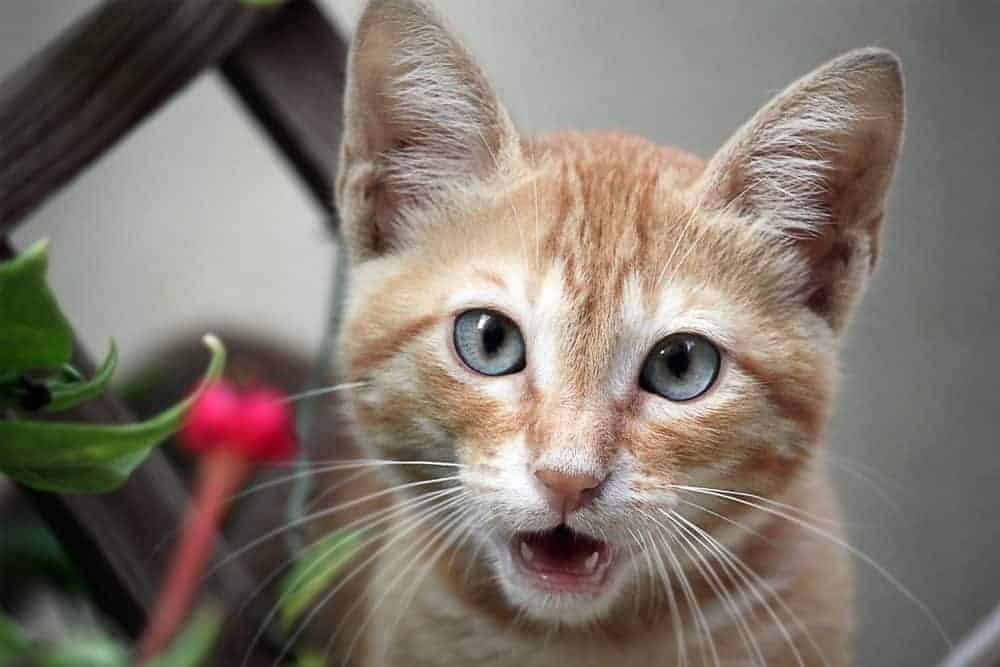
Cats are great at hiding when they’re in pain, so it can be difficult to see if they have a problem with their teeth, particularly if they’re eating and drinking as normal. In fact, cats commonly suffer with disorders of the teeth, jaw and mouth and it’s estimated that up to 70% of cats develop dental disease by the age of three.
Symptoms that your cat may have an issue, which means it’s time to see your vet, include:
- Reduced grooming, leading to poor condition of your cat’s coat
- Bad breath
- Drooling
- Pawing at the mouth
- Bleeding gums
- Discomfort when eating
- Reduced appetite or weight loss
Two of the most common causes of mouth problems are periodontal disease and gingivitis.
Peridontal disease
This is the inflammation and weakening of the tissues that surrounds a cat’s teeth. It causes the development of pockets around the tooth and can eventually lead to tooth loss. This is usually caused by bacteria and plaque in the mouth. If your cat has periodontal disease and the problem isn’t too serious, your vet will be able to clean the teeth above and below the gum line while your pet is under a general anaesthetic. Combined with dental home care and regular check-ups, this can be an effective treatment. If your cat’s periodontal disease is advanced, it may require tooth extraction.
Did you know?
Kittens have 26 baby teeth, which are replaced by 30 adult teeth by the age of six months.
Gingivitis
This is an inflammation of a cat’s gums. If allowed to progress, it can lead to receding gums and even loss of teeth. Mild gingivitis is common, particularly in kittens as their adult teeth come through. Dependent on the severity of the condition, treatment can include the use of antibiotics or anti-inflammatory medicine, dental treatment under general anaesthetic or home care management.
How a good diet can help
Just as with humans, providing cats with a healthy and balanced diet will limit the chance of dental problems. Dry food in particular can help to maintain healthy teeth and gums. Avoid feeding sugary treats. Although sugar isn’t poisonous to cats, it has no nutritional value and can erode enamel, leading to tooth decay and dental disease.
Our Burgess cat food range supports the dental health of adult cats. By the age of 3, 70% of cats will show signs of dental disease which is why our Burgess Cat recipes help cats to maintain good all-round mouth health. This is especially useful for mature cats because, as cats get older, their risk of dental problems increases.
How to keep your cat’s teeth clean
Making tooth brushing part of your cat’s daily routine will also help maintain good dental health. Here’s a helpful guide from Cats Protection:
- First, ask your vet to show you how to brush your cat’s teeth correctly
- Buy specialist cat toothpaste – you can even buy some that’s chicken-flavour. Cats should never use human toothpaste
- Purchase a toothbrush that is designed for cats – your vet or local pet shop should have something suitable
- Begin by putting your cat’s toothpaste on your finger and offering it to them to lick
- Choose a time of day that you can stick to, so that teeth brushing becomes part of your pet’s normal routine
- Ensure you are calm and comfortable, then slowly and gently pull back your cat’s lips and touch their teeth with the toothbrush initially, before soothing your cat
- Repeat this daily for several days and, only when they’re really comfortable, gently start brushing your cat’s teeth
- Apply the bristles to the teeth at a 45-degree angle, reaching both the tooth surface and just beneath the gum margin
Early treatment is best
Your vet will examine your cat’s mouth at their annual check-up, so it’s very important to keep this appointment so that any problems can be dealt with before they become too serious. Remember that having a healthy mouth is likely to improve the quality of your cat’s life.
If you found this interesting, you may also like:
Why vaccinations should be a no-brainer According to PDSA’s Animal Wellbeing (PAW) Report, a quarter of the nation’s dogs and a third of its cats missed out on life-saving jabs when they were puppies and kittens. Our in-house vet Dr Suzanne Moyes outlines why regular vaccinations are an essential part of caring for our pets
The dangers of diagnosing your pet's problems online If you’re worried about your pet’s health, you should always seek advice from your veterinary surgeon, rather than a search engine
Long live cats! What can you do to help your cat enjoy a happy, healthy and long, long life? Start by following our 12 top tips...
Source: cats.org.uk














